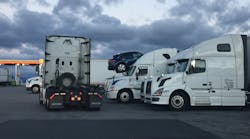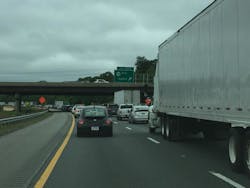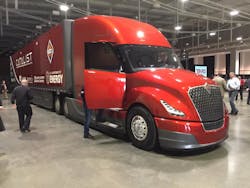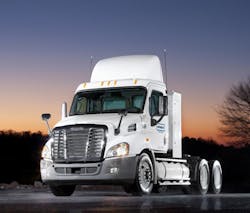It’s one of those by-now almost unsurprising policy stances when it comes to energy consumption and freight movements: the portrayal of trucks as “bad apples,” despite their critical role in delivering everything that keeps our modern lives up and running.
[Did a railroad locomotive deliver goods ordered via Amazon to your door? Does fresh milk get delivered by horse and wagon in your neighborhood? I didn’t think so.]
The International Energy Agency (IEA) is but the latest group to engage in a lot of tut-tutting about commercial vehicles in its recent 167-page tome entitled The Future of Trucks: Implications for energy and the environment.
“Trucks are a major contributor to the growth in transport-fuel consumption, as well as rising carbon dioxide and air pollutant emissions,” the IEA noted in its report. “But the sector gets far less attention and policy focus than passenger vehicles. Only four countries have energy-efficiency standards for heavy trucks, compared with about 40 countries with passenger-vehicle standards.”
The group goes on to stress that the growth in oil demand from trucks outpaced all other sectors over the last 17 years – including passenger cars, aviation, industry and petrochemical feedstocks – and contributed 40% to global oil demand growth over that period.
Today, IEA added, trucks account for almost a fifth of global oil demand, or around 17 million barrels per day – equivalent to the combined oil production of the U.S. and Canada, according to the agency’s number crunching – and also account for about half of global diesel use, a third of all transport-related carbon emissions and a fifth of oxides of nitrogen (NOx) emissions, which the IEA stressed is “a key air pollutant.”
Where have I heard that before? Oh yeah; over that decade-plus effort here in America to reduce NOx from commercial trucks (and particulates, too – don’t forget them) to infinitesimal levels. And that effort wasn’t cheap, either, with truckers getting no tax breaks or subsidies to become more “green.”At least the IEA tipped its hat to the valuable role trucks serve in supporting modern-day living: “Trucks are a key enabler of global economic activity and play an essential role in delivering goods or commodities across every point of the economic value chain, from production to sale.”
Well said, well spoken.
However, the group then went on to warn that “if no action is taken” oil demand from road freight is projected to grow by five million barrels per day by 2050, or around 40% of the projected increase in global oil demand in that period.
“This growth is expected to lead to a significant increase in carbon dioxide emissions of nearly 900 million tonnes through 2050, or about the same level of emissions growth as from coal use in the power and the entire industry sector combined,” the IEA said in its report – noting that the main drivers of oil demand from trucks today are the U.S., the European Union and China, while India is emerging as a growing contributor.
Economic growth, particularly in Asia, will continue to boost oil demand from trucking in the future, the group added.
So here are some policy recommendations IEA believes will alleviate those issues.
First, the trucking sector can improve logistics and systems operations in order to be more efficient. This includes near-term opportunities like using GPS to better optimize truck routing, as well as using real-time feedback devices that monitor the on-road fuel economy of trucks.
[Um, hey folks; U.S. truckers are already doing that. Go here for some examples.]
“Greater improvements on that front will require increased cooperation, as well as the exchange of data, information and assets across the entire supply chain,” IEA said. “This can help increase the volume or weight of cargo hauled to improve the load on each trip, but also reduce the number of trips during which trucks are running empty, such as travel taken without any load at all after having delivered the goods.”
Oh, I see: reform size and weight rules, by allowing trucks to get bigger so they can haul more stuff – thus requiring fewer of them on our roads.
Hey, you guys do realize that there are a whole host of groups vehemently opposed to such reform, right? And that even U.S. government agencies are lukewarm at best in their support of such reform?
Then there’s the second recommendation in the IEA’s report: finding more ways to improve the energy-efficiency of existing trucks and trailers, including aerodynamic retrofits to reduce drag as well as low-rolling resistance tires.
“New trucks can use additional technologies that cut idling, use lightweight materials and take advantage of improvements to truck engines, transmissions and drivetrains,” the group said. “Achieving stronger cuts in fuel use, carbon dioxide and pollutant emissions requires the use of hybrids and zero emission trucks.”
Um, that’s being done, too. In fact, attaining fuel economy of 10 mpg for big rigs is so five years ago; indeed, some truck engineers believe the 10 mpg will become “the new normal” within the industry very soon.
OK, so what’s the third recommendation? Ah! Here’s a surprise (not): using alternative fuels such as natural gas, biofuels, electricity and hydrogen.
“[Those] can diversify fuel supply away from oil and also help reduce carbon emissions, especially if produced from low-carbon pathways,” the IEA explained.
Well …
The trucking industry here in America has been experimenting broadly with all of those alternative fuels – heck, TL carrier U.S. Xpress Enterprises is eyeing a big purchase of the Nikola One hydrogen-fueled electric Class 8 tractor when it starts production in 2020 – but of course the stumbling block remains the cost to do so.
Remember: all those consumers picking and clicking on e-commerce sites want their orders delivered fast and free. And that feeling is shared by shippers, too; they continue to squeeze hard on freight rates, which hurts trucking’s bottom line.
Not exactly an environment conducive to spending more on “green” technology, is it?
The IEA stressed, though that, when all three of its recommendations are taken together, they can help craft a “sustainable policy pathway for truck transport” that could reduce energy use in road freight by 50% and emissions by 75% by 2050.
“For far too long there has been a lack of policy focus on truck fuel efficiency,” noted Dr Fatih Birol, executive director of the IEA, in the group’s report.
“Given they are now the dominant driver of global oil demand, the issue can no longer be ignored if we are to meet our energy and environmental objectives” he said. “Our study highlights the gains that are possible from tighter truck fuel efficiency standards and sets out other cost-effective steps to modernize freight transport.”
Well, from where I sit, truckers – especially in the U.S. – have already been doing those very things, often in the face of significant resistance. So if groups like the IEA really want to reduce truck fuel consumption, they need to offer more support for size and weight reform plus higher freight rates as well, among other things.
I won’t hold my breath waiting for said support, though.






